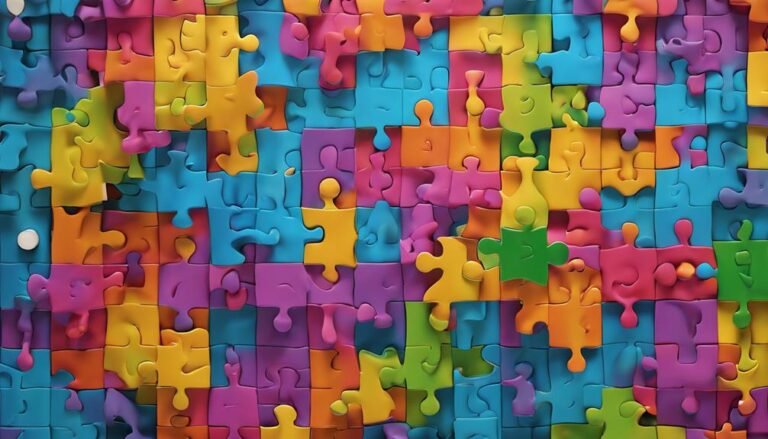The Role of Personality in Romantic Relationships
As you navigate the intricate dance of romantic relationships, imagine personalities as the intricate brushstrokes that paint the canvas of your connection. How do these unique hues blend to create a masterpiece of love and understanding, or do they clash in a discordant symphony of misunderstandings? Personality traits hold the key to revealing the mysteries of your partner’s inner world, shaping the dynamics of your bond. But what happens when these traits diverge, and how can you bridge the gap to cultivate a harmonious union?
Key Takeaways
- Personality traits influence compatibility and behavioral patterns in relationships.
- Understanding communication styles enhances emotional connection.
- Conflict resolution and emotional intelligence impact relationship dynamics.
- Attachment styles and love languages shape emotional bonds.
- Introversion, extroversion, neuroticism, and agreeableness affect relationship dynamics.
Personality Traits and Compatibility
When maneuvering romantic relationships, understanding how personality traits influence compatibility is essential for fostering a strong connection. Compatibility assessment and personality tests can offer valuable insights into your behavioral patterns and the dynamics within your relationship. These tools can help you navigate the complexities of interpersonal relationships by shedding light on areas of potential synergy and areas that may require compromise.
By delving into your personality traits and those of your partner, you can identify areas of common ground that form a solid foundation for your relationship. Recognizing where your personalities align can strengthen your bond and create a sense of harmony. Conversely, understanding where differences lie can help you appreciate each other’s unique perspectives and find ways to complement one another.
Behavioral patterns play a significant role in shaping relationship dynamics. By being aware of how your personalities interact and influence each other, you can proactively address any challenges that arise. Embracing these differences with empathy and understanding can lead to a more fulfilling and balanced partnership.
Communication Styles in Relationships
Understanding the diverse communication styles present in romantic relationships is essential for fostering effective and meaningful interactions. Nonverbal cues play a significant role in conveying emotions and intentions in a relationship. Being aware of your partner’s body language and facial expressions can help you better understand their feelings, even when they aren’t explicitly stated.
Emotional responsiveness is another vital aspect of communication in relationships. Responding empathetically and validating your partner’s emotions can strengthen the emotional bond between you.
Active listening is a fundamental skill that can enhance communication between partners. By actively listening to your partner’s thoughts and feelings without interruptions or distractions, you show them that you value their perspective.
Additionally, employing assertiveness techniques can help you express your needs and boundaries clearly and respectfully. Assertiveness allows both partners to communicate openly and honestly, leading to a more transparent and harmonious relationship.
Conflict Resolution Strategies
Utilizing effective conflict resolution strategies is essential for maintaining a healthy and thriving romantic relationship. When conflicts arise, it’s important to employ appropriate techniques to navigate through them.
Recognizing emotional triggers, such as past experiences or insecurities, can help you understand why certain issues evoke strong reactions. By acknowledging these triggers, you can approach conflicts with empathy and a deeper understanding of your partner’s perspective.
Compromise strategies play a significant role in resolving conflicts. Finding common ground and being willing to make concessions can foster mutual understanding and strengthen the bond between partners.
It’s also important to set clear boundaries to establish respect and communication guidelines during disagreements. Setting boundaries helps prevent conflicts from escalating and ensures that both individuals feel heard and valued in the relationship.
Emotional Intelligence and Empathy
You can deepen your emotional connection by understanding your partner’s feelings, acknowledging their emotions, and responding with empathy.
Effectively expressing empathy can create a safe space for open communication and foster a sense of mutual understanding and support.
Understanding Partner’s Emotions
Developing a deep understanding of your partner’s emotions is essential for fostering a strong and meaningful connection in a romantic relationship. Emotional validation and effective listening are key components in this process. By acknowledging and validating your partner’s feelings, you show that you respect and care about their emotional well-being.
Effective listening involves actively paying attention to your partner’s verbal and non-verbal cues, allowing you to grasp the underlying emotions they’re experiencing.
Understanding boundaries and respecting emotions are vital aspects of navigating your partner’s emotional landscape. Respecting your partner’s boundaries means recognizing when they need space or time to process their feelings without feeling pressured. It also involves being mindful of how your actions and words can impact their emotional state.
Expressing Empathy Effectively
Understanding and effectively expressing empathy is an essential aspect of emotional intelligence that plays a pivotal role in nurturing a deep connection in romantic relationships. Active listening, which involves truly focusing on your partner’s words and feelings, is key to expressing empathy. By actively listening, you demonstrate that you value your partner’s perspective and emotions.
Additionally, emotional validation is vital in expressing empathy effectively. Acknowledging your partner’s feelings and showing understanding can strengthen the emotional bond between you both.
Nonverbal cues also play a significant role in expressing empathy. Mirroring your partner’s emotions through nonverbal cues like facial expressions and body language can show that you’re attuned to their feelings. This mirroring can help your partner feel understood and supported on a deeper level.
Enhancing Emotional Connection
Enhancing emotional connection in romantic relationships relies heavily on one’s emotional intelligence and ability to express empathy effectively. Emotional vulnerability plays a pivotal role in establishing trust and fostering a deeper bond.
By being open and honest about your feelings, you create a safe space for your partner to do the same, leading to increased emotional intimacy.
Self-awareness is key in understanding your own emotions and how they impact your relationship. Recognizing your triggers and communication style can help you navigate disagreements more effectively and strengthen your connection with your partner.
Additionally, being attuned to your partner’s emotions and responding with empathy can enhance mutual understanding and closeness.
Empathy allows you to see things from your partner’s perspective, validating their feelings and experiences. By actively listening and showing compassion, you demonstrate that you care about their well-being and are invested in the relationship.
Cultivating emotional intelligence and empathy is essential for creating a strong emotional connection that can withstand challenges and deepen over time.
Attachment Styles and Love Languages
An individual’s attachment style and love languages play a significant role in shaping the dynamics of their romantic relationships. Attachment styles, influenced by early relationships, can impact how you form connections with your partner. Trust issues and communication patterns often stem from past experiences, affecting how you interpret and respond to your partner’s actions.
Understanding your affection preferences and attachment style can lead to deeper emotional connections. Love languages, such as words of affirmation, acts of service, receiving gifts, quality time, or physical touch, provide insight into how you express and interpret love. It’s important to communicate your preferred love language to your partner to make sure both of you feel loved and appreciated.
Recognizing each other’s attachment styles and love languages can help navigate conflicts and strengthen your bond. By acknowledging and respecting these differences, you can create a more harmonious and fulfilling relationship built on understanding and empathy.
Influence of Introversion and Extroversion
When it comes to introversion and extroversion in romantic relationships, understanding how your partner’s personality traits influence interactions is essential.
Introversion can bring depth and thoughtfulness to the relationship, while extroversion can add energy and social connection.
Finding a balance between these two traits can lead to a dynamic and harmonious partnership.
Introversion’s Impact on Relationships
Understanding how introversion influences romantic relationships can provide valuable insights into the dynamics between partners and help foster stronger connections based on mutual understanding and acceptance. Introverted individuals often experience social exhaustion more quickly than extroverts, needing time alone to recharge their energy.
In a romantic relationship, this need for solitude and personal boundaries can sometimes be misunderstood by their partners. It’s essential for both partners to communicate openly and respect each other’s differences in social needs.
Introverts tend to cherish their personal space and may require more time alone compared to extroverts. This doesn’t mean they’re disinterested in their partners; instead, it’s a way for them to rejuvenate and feel more connected when they do engage.
Partners of introverts can support them by understanding their need for solitude, encouraging open communication about boundaries, and finding a balance that works for both individuals in the relationship. By recognizing and honoring each other’s social preferences, introverted individuals can feel more comfortable and secure in their romantic relationships.
Extroversion in Romantic Dynamics
How does extroversion impact the dynamics of romantic relationships when considering the influence of introversion and extroversion?
Extroversion plays a significant role in shaping the social energy and relationship dynamics within a romantic partnership. Individuals high in extroversion are often outgoing, sociable, and thrive in social settings. In romantic relationships, this can manifest as a partner who enjoys spending time with others, is comfortable in group settings, and may actively seek out new social connections.
The social energy that extroverted individuals bring into a relationship can positively influence the dynamics by introducing excitement, spontaneity, and a vibrant social life. They may be more inclined to initiate activities, engage in conversations, and foster a lively atmosphere within the relationship. However, it’s essential to recognize and respect the needs of introverted partners who may require alone time to recharge.
Balancing the social energy and relationship dynamics between introverted and extroverted partners is key to fostering a harmonious and fulfilling romantic connection. Communication, understanding, and compromise are essential in managing the differences in social preferences and ensuring that both partners feel valued and supported.
Balancing Personality Differences
Managing the balance of personality differences between introversion and extroversion in romantic relationships requires a nuanced understanding of each partner’s social preferences and needs. Understanding that introverts draw energy from solitude and introspection, while extroverts thrive in social settings and draw energy from interactions, is vital.
To maintain a healthy relationship, compromise and understanding are key. Introverted partners may need alone time to recharge, which extroverted partners should accept and support. At the same time, extroverted partners can gently encourage introverted partners to engage in social activities, but without overwhelming them. Finding a middle ground where both partners feel heard and respected is pivotal.
Acceptance, compromise, and communication are vital in striking a balance between introversion and extroversion. By acknowledging and respecting each other’s needs, couples can create a harmonious balance that allows both individuals to feel supported and valued in the relationship.
Impact of Neuroticism and Agreeableness
Neuroticism and Agreeableness play significant roles in shaping the dynamics of romantic relationships, influencing how individuals interact and connect with their partners. Neuroticism effects can lead to heightened emotional reactivity, insecurity, and a tendency to worry excessively.
In contrast, individuals high in Agreeableness tend to be compassionate, cooperative, and accommodating in their relationships. This interplay of personality traits can have profound relationship implications.
For instance, a partner high in Neuroticism may require reassurance and support from their more Agreeable counterpart. Understanding each other’s personality traits can help navigate conflicts with empathy and patience.
It’s essential for individuals to recognize how Neuroticism and Agreeableness influence their behaviors and communication styles within the relationship. By fostering open and honest conversations, partners can work together to create a supportive and nurturing environment that embraces each other’s unique traits.
Embracing these differences can lead to a deeper connection and a more harmonious romantic bond.
Role of Openness to Experience
Hey there, ready to explore how your level of openness to experience can shape your romantic relationships?
Openness influences how you communicate with your partner and can impact your overall compatibility.
Let’s investigate how being open to new ideas and experiences can enrich your connection with your significant other.
Openness and Communication
In romantic relationships, the role of openness to experience is essential in fostering effective communication and understanding between partners. When you embrace openness, you create a foundation of trust building within the relationship. By being open about your thoughts, feelings, and experiences, you allow your partner to see the real you, which in turn encourages them to reciprocate. This mutual vulnerability sharing deepens the emotional connection between you and your partner, leading to a stronger bond.
Openness enables you to communicate openly and honestly, paving the way for more meaningful conversations. It allows you to express your needs, desires, and concerns in a way that promotes understanding and empathy.
When both partners are open to sharing their vulnerabilities, it creates a safe space for open and honest communication to flourish. This, in turn, enhances the overall quality of the relationship and fosters a deeper sense of intimacy between you and your partner.
Impact on Compatibility
Embracing openness to experience in your romantic relationship greatly influences the compatibility between you and your partner. Compatibility assessment often involves evaluating how your personality traits align with your partner’s. Openness to experience plays an essential role in this assessment.
When both partners exhibit a high level of openness, they’re more likely to engage in new and exciting experiences together, fostering a deeper connection and understanding.
However, when differences in openness to experience arise, it can impact relationship dynamics. Varying levels of openness may lead to challenges in finding common ground or shared interests. Understanding and respecting these differences is key to maintaining compatibility.
It’s essential to communicate openly about how your differing levels of openness may affect the relationship and work towards finding a balance that satisfies both partners.
Navigating personality differences, especially regarding openness to experience, requires empathy and a willingness to compromise. By acknowledging and appreciating each other’s unique traits, you can strengthen your bond and create a more harmonious and fulfilling relationship.
Power Dynamics and Dominance
Understanding power dynamics and dominance plays a pivotal role in maneuvering through the complexities of romantic relationships.
Dominance dynamics within a relationship can often lead to power struggles, where one partner may try to assert control or influence over the other. These dynamics can arise from various factors such as personality traits, communication styles, or societal norms.
It is important to recognize that power imbalances can greatly impact the dynamics of a relationship.
In some cases, one partner may exhibit more dominant traits, leading to a hierarchical structure within the relationship. This can create tension and conflict, especially if one partner feels suppressed or unheard.
Navigating power dynamics requires open communication, mutual respect, and a willingness to address any underlying issues.
It’s essential for both partners to feel valued and respected in the relationship, fostering a sense of equality and partnership.
Long-Term Relationship Satisfaction
Maintaining long-term relationship satisfaction requires continuous effort and intentional investment from both partners. Trust-building activities and effective conflict resolution techniques play an essential role in nurturing a strong emotional connection and fostering relationship satisfaction over time.
Engaging in activities that promote trust, such as open communication, honesty, and reliability, can help solidify the foundation of your relationship. Building trust allows for a deeper emotional connection, which is vital for long-term satisfaction in a romantic partnership.
When conflicts arise, it’s important to address them constructively using techniques like active listening, compromise, and empathy. Resolving conflicts in a healthy manner can strengthen the bond between partners and enhance overall relationship satisfaction.
Remember that maintaining a fulfilling long-term relationship requires ongoing effort and a willingness to work through challenges together. By prioritizing trust-building activities and mastering conflict resolution techniques, you can cultivate a lasting and satisfying romantic connection with your partner.
Conclusion
As you navigate the complex landscape of romantic relationships, remember that personality traits can either complement or clash, shaping the dynamics between you and your partner.
Communication, conflict resolution, emotional intelligence, and attachment styles all play a vital role in fostering a deep connection.
Embrace the differences in personalities, for they can lead to growth and understanding.
By being mindful of these factors, you can cultivate a strong, fulfilling relationship built on respect and empathy.







